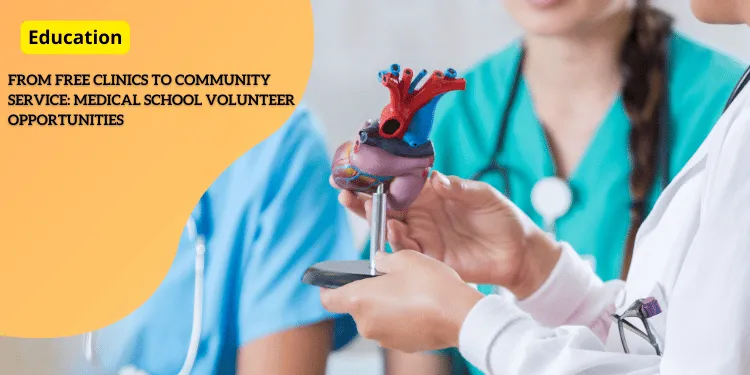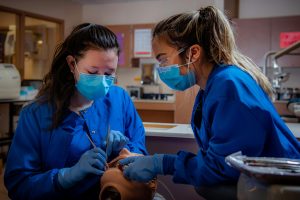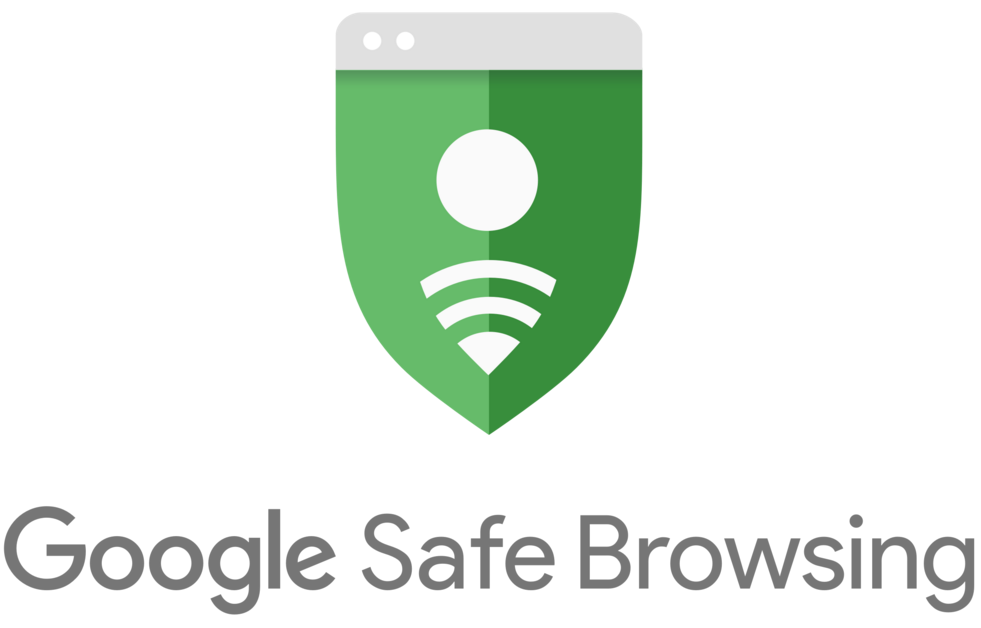From Free Clinics to Community Service: Medical School Volunteer Opportunities

Anúncios
Volunteering during medical school offers numerous personal and professional benefits.
It allows students to balance the intense demands of their academic workload while developing critical skills and gaining a broader understanding of the healthcare landscape.
Anúncios
One of the key advantages is that it helps students avoid burnout and maintain their empathy, which is vital throughout their medical training.
 School of Medicine
School of Medicine
Personal and Professional Benefits
Engaging in volunteer work, whether at free clinics, mentoring premedical students, or participating in public education, sharpens students’ skills and shapes their career decisions.
Anúncios
It also provides insights into the administrative aspects of medicine and enhances their communication and teamwork abilities.
These experiences are invaluable as they prepare for their future roles as healthcare providers.
| Volunteer Opportunity | Benefits | Skills Developed | Impact |
|---|---|---|---|
| Free Clinic Volunteering | Provides healthcare to underserved populations. | Clinical skills, teamwork, communication, empathy. | Helps bridge healthcare gaps, enhances student training. |
| Mentorship Programs | Guides pre-med and high school students. | Leadership, teaching, communication, organizational skills. | Inspires future healthcare professionals, supports career paths. |
| Community Health Education | Educates public on health issues. | Public speaking, education, community outreach, teamwork. | Improves public health knowledge and outcomes. |
| Social Justice and Health Equity | Addresses social determinants of health (SDOH) like food insecurity. | Advocacy, understanding social factors, empathy. | Promotes health equity and improves community well-being. |
Avoiding Burnout and Maintaining Empathy
Medical school can be incredibly demanding, leading to stress and burnout.
Volunteering offers a way to break up the monotony of lectures and studying, filling students’ own buckets and ensuring they remain functional and successful.
Research suggests that volunteering helps maintain empathy during medical school, a crucial element in providing compassionate care to patients.
Finding the Right Opportunities
It’s essential for medical students to find volunteer opportunities that align with their personal interests.
Whether it’s volunteering at student-run free clinics, mentoring high school students, or participating in community health education, finding passion-driven missions ensures that the volunteer work is fulfilling and complements their medical education.
Moreover, non-medical volunteering can help students maintain their identities and stay rooted in their broader community.
By thoughtfully engaging in meaningful volunteer work, medical students can enhance their professional growth and personal well-being, ultimately becoming more empathetic and effective healthcare providers.
Free Clinic Volunteering
Providing Healthcare Access to Underserved Populations
Volunteering at student-run free clinics is one of the most impactful ways medical students can contribute to the community while enhancing their own training.
These clinics often serve underserved populations who lack access to affordable healthcare.
By offering their time and skills, students help bridge the gap in healthcare access, providing essential services to those in need.
This experience enables students to see firsthand the challenges and disparities within the healthcare system.
Gaining Clinical and Administrative Experience
Free clinic volunteering offers ample opportunities for both clinical and administrative work.
On the clinical side, students can assist with patient consultations, conduct physical exams, and develop treatment plans under the supervision of experienced physicians.
These hands-on experiences are invaluable for building clinical skills early in medical training.
For those inclined towards the administrative side, free clinics provide a platform to learn about the operational and managerial aspects of running a healthcare facility.
Roles can include managing clinic schedules, coordinating volunteer efforts, and ensuring the clinic complies with healthcare regulations.
Understanding these components is crucial for any future healthcare professional.
Developing Communication Skills and Teamwork
Working at a free clinic enhances essential soft skills such as communication and teamwork.
Students must interact with a diverse patient population, often requiring them to simplify complex medical jargon into understandable terms.
Moreover, the collaborative environment of a free clinic fosters teamwork, as students work alongside other volunteers, healthcare professionals, and administrative staff to deliver holistic patient care.
These experiences not only advance clinical dexterity but also reinforce the importance of empathy and compassion in medical practice.
Volunteering helps maintain the humanity that is sometimes lost in the rigor of medical education, preparing students to become well-rounded healthcare providers.
As medical students immerse themselves in the various facets of clinic operations, they gain meaningful insights that shape their professional journey.
This exposure helps them appreciate the multifaceted nature of healthcare, beyond just patient interaction.
Next, we’ll explore the significant role mentorship programs play in supporting the next generation of medical professionals.
Mentorship Programs
Opportunities to Mentor High School and Pre-med Students
Mentorship programs offer medical students the chance to guide high school and pre-med students who aspire to enter the healthcare field.
Through programs such as Duke SNMA’s Health Professions Recruitment and Exposure Program, medical students can help young learners explore careers in STEM and medicine.
These programs often involve organizing events where high school students can work on their resumes, participate in mock interviews, and attend panels with medical professionals—ultimately fostering their interest and knowledge in the medical field.
Involvement in STEM Education and Career Exposure Programs
Engaging in STEM education and career exposure programs not only benefits mentees but also provides significant rewards for medical student mentors.
Mentorship allows medical students to share their knowledge and experiences, offering valuable insights into the educational and career paths in healthcare.
This involvement helps bridge the gap between high school education and advanced medical studies, inspiring the next generation of healthcare professionals.
Helps Develop Leadership and Teaching Skills
Through mentorship roles, medical students can develop critical leadership and teaching skills.
Leading discussions, creating educational materials, and guiding mentees through complex subjects contribute to growth in communication and organizational skills.
These experiences also help medical students become more confident in their knowledge and their ability to convey information effectively.
Teaching and mentoring reinforce their own learning while fostering a supportive environment for younger students.
Engaging in mentorship programs enriches medical students’ educational journey, enhancing their ability to lead, teach, and empathize.
The transition into the next aspect of volunteering lies in understanding the holistic impact these roles have on personal and professional growth.
Community Health Education
Participation in Public Health Education Initiatives
Community health education is a rewarding way for medical students to engage with their communities.
Participating in public health education initiatives allows students to make a significant impact by spreading crucial health information. Medical schools often collaborate with local organizations to create targeted health campaigns.
These initiatives might include workshops on nutrition, hygiene, and disease prevention tailored to address the specific needs of the community.
Med students might find themselves teaching sessions on the importance of vaccinations, conducting screenings for common health issues, or organizing health fairs.
Such activities are not only beneficial for the community but also help students understand the links between education and health outcomes.
Collaboration with Local Schools and Healthcare Organizations
Engaging with local schools and healthcare organizations can amplify the reach of health education programs.
Medical schools often partner with public schools to provide pertinent health education.
For example, students may visit schools to conduct educational sessions on topics such as mental health, substance abuse prevention, and sexual education.
These collaborations are pivotal in promoting a well-rounded approach to public health.
Students can also work alongside healthcare organizations to conduct community workshops.
By allying with entities like local hospitals, health departments, and non-profits, medical students can ensure the delivery of up-to-date and accurate health information to the broader community.
Addressing Common Health Concerns and Preventive Care
Addressing common health concerns through community initiatives is a critical component of community health education.
This often includes educational campaigns aimed at preventing chronic illnesses like diabetes, hypertension, and obesity.
Medical students can educate the public about lifestyle changes, the importance of regular check-ups, and the benefits of preventive care to mitigate these concerns.
Moreover, medical students come into contact with various community health issues, gaining insights into the social determinants of health.
Providing information on preventive measures like proper diet and regular exercise can substantially improve public health knowledge, potentially reducing the incidence of preventable diseases.
Through their experiences in community health education, medical students develop a deeper appreciation for community engagement and preventive care.
This understanding enriches their medical education and prepares them to be proactive healthcare providers attuned to the needs of their communities.
Now that we’ve explored the vital role of community health education, other facets of Medical School Volunteering await, offering varying opportunities for engagement and growth.
Social Justice and Health Equity
Addressing Social Determinants of Health
Understanding the social determinants of health (SDOH) is crucial for medical students aiming to provide comprehensive care.
SDOH are the conditions in which people are born, live, work, and grow. These factors affect a wide range of health outcomes and risks.
By recognizing these elements, future physicians can better understand how various factors like economic stability, education, and neighborhood environments contribute to health disparities.
Involvement in Food Security Initiatives
Many medical students volunteer with organizations focused on food security to directly address one of the key social determinants of health.
Programs like Root Causes at Duke University distribute fresh produce to those in need, improving nutrition among underserved populations.
Initiatives like these not only combat hunger but also provide students with insights into the ways in which access to food affects overall health.
Economic Assistance Programs
Economic stability plays a significant role in an individual’s overall health.
Programs such as StreetCred at Boston Medical Center integrate economic assistance into healthcare.
By offering services like tax preparation, these programs help alleviate financial stress for low-income families, thus contributing to better health outcomes.
Medical students participating in these programs can see firsthand the impact of economic stability on their patients’ well-being.
Connecting Community Health and Social Justice
Volunteering in programs that address social determinants of health brings to light the intricate link between community health and social justice.
It reveals how factors like poverty, education, and housing can influence health outcomes.
This awareness can shape how future doctors approach patient care, ensuring they consider both medical and socio-economic factors.
Engagement in these initiatives helps medical students develop a holistic approach to patient care, enriching their professional growth and personal empathy.
This groundwork sets the stage for exploring the importance of maintaining a balanced life through non-medical volunteering.
Non-Medical Volunteering
Benefits of Maintaining Involvement in Non-Medical Service Work
Volunteering in non-medical contexts can be as enriching as medical volunteering.
Engaging in community service outside of healthcare allows medical students to stay grounded and maintain their broader identities.
For instance, continuing previous volunteer commitments, like helping out at a church or community center, ensures that students remain connected to their roots.
According to US News, these activities help balance the intense demands of medical school with meaningful, passion-driven missions.
Balancing Medical Studies with Broader Community Engagement
Maintaining a balance between medical studies and broader community engagement is essential.
Meaningful non-medical volunteer work can be a refreshing change from the academic routine.
It provides a break from the intensive focus on lectures and studying, ultimately helping to stave off burnout.
Owen Lubinski, the co-executive director of the GW Healing Clinic, emphasizes that fulfilling volunteer work can enhance your personal well-being and make you a better person overall.
Maintaining Personal Identity Outside of Medicine
Engaging in non-medical volunteering also helps in maintaining a personal identity outside the realms of medicine.
It can prevent the feeling of being overwhelmed by medical education and ensure that students retain a sense of self.
Whether it’s working with a local theater group, participating in environmental clean-up projects, or contributing to an animal shelter, these activities can provide a sense of fulfillment and balance.
This holistic approach to volunteering fosters well-rounded development and empathetic understanding, both crucial traits for future medical professionals.







